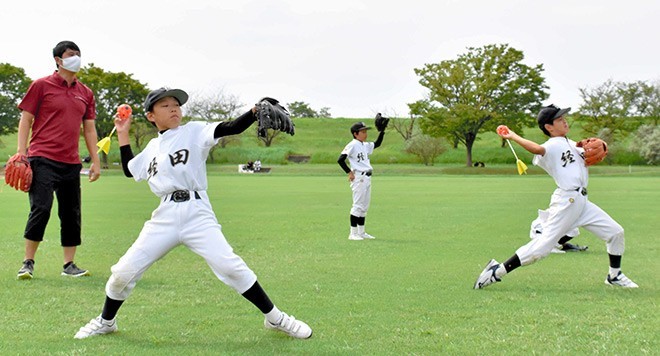
October 13, 2020
TAKAOKA, Toyama Prefecture (October 12 The Asahi Shimbun)-- Thousands of baseball players, from little leaguers to professionals, are trying to perfect their pitching techniques with a device inspired by a paper airplane.
Takeshi Fujita, a baseball coach in Takaoka, Toyama Prefecture, initially developed the “Kiredas” practice gear to teach children how to throw properly.
But sales of the product have taken off for all ages both in Japan and overseas. So far, 20,000 of them have been sold in the past six months or so.
The Kiredas is a shaft with a Whiffle ball on its tip. First-timers have hard time throwing it straight, and the shaft usually drops on the ground immediately.
But after some practice, they can toss the shaft back and forth in beautiful arcs that land in the other’s glove.
Fujita, 38, who offers baseball lessons in Takaoka, said the gear makes it easier for young players to know a good pitch from a bad one, thus improving their throwing technique.
“When I pitched after practicing with Kiredas, the baseball felt so light and glided through the air,” said a male fifth-grader who was playing baseball in a park in Toyama in late September.
When a pitcher’s elbow is too low or the wrist comes under too much pressure, the shaft of the Kiredas hits the dirt.
But if the elbow is high and the entire body is used to throw, the shaft sails through the air.
“You can’t really cheat with Kiredas,” Fujita said.
He said that practicing with Kiredas helps young players “develop a feel of how to push out a ball by using their fingertips,” which is critical in making the pitches sharper.
Fujita was an ace pitcher at Takaoka Koryo High School and the Toyama University of International Studies. He played for an amateur team of TDK Corp. in Akita Prefecture and won championships in inter-city baseball tournaments.
He retired and started teaching baseball to children about three years ago.
Fujita quickly noticed that many children used only their arms to pitch, a technique that is not only hard on the shoulder and elbow and could lead to injuries but also fails to gain full power behind the throw.
However, it was difficult for Fujita to verbally teach the youngsters the things he had developed over his many years as a player.
Wishing he had something that the children could use to learn how to pitch while having fun, his memories of playing with a paper airplane came back to him.
“I remember I tried over and over to make it fly farther,” he said. “That way, I learned how to release it without any strain.”
He thought that combining a paper plane with a baseball would work.
In April 2019, he made a prototype named “Fujita stick” and used it in his class with no thoughts about commercializing it.
But in autumn that year, Ryuichi Tsuguchi, a former teammate at TDK, suggested he develop the product.
Tsuguchi, a 41-year-resident in Osaka, saw a video of children pitching with the Fujita stick and was surprised by the “before and after” effects.
He then used it himself.
“It had been a while since I retired from baseball, but the feeling I had during my playing days immediately came back,” Tsuguchi said.
Tsuguchi and Fujita, along with others, went through a trial and error process. In February this year, Fujita’s company released Kiredas.
After the product was covered by sports media, orders came flooding in.
Top-class high school baseball clubs have added Kiredas to their practice routines. Professional baseball teams in Japan and Taiwan have also bought the product.
Shinya Miyamoto, a former infielder with the pro team Yakult Swallows, said practicing with Kiredas helps “develop a better sense of throwing a ball by using the entire body in a reproducible fashion and reduces mistakes.”
Fujita has hosted demonstration sessions in various places while encouraging children who are struggling with their pitching.
“There are some talented players who quit baseball before getting the hang of it,” Fujita said. “I hope this gear prevents them from getting injured and offers an opportunity for people to take the challenge and try to improve,” Fujita said.
Tsuguchi said “the ability to throw a ball better” also helps players in other sports.
They hope that many schools will use Kiredas to fuel interest in baseball and increase the number of young ballplayers.
A Kiredas for beginners is sold at a tax-inclusive 4,950 yen ($47). The one for intermediate and advanced players costs 6,600 yen.
For more information: (https://backstage-baseball.com/kiredas)
(Photo: Children learn how to make better pitches with “Kiredas” in Toyama in September)
© Baseball Federation of Asia. All RIGHTS RESERVED. / PRIVACY POLICY